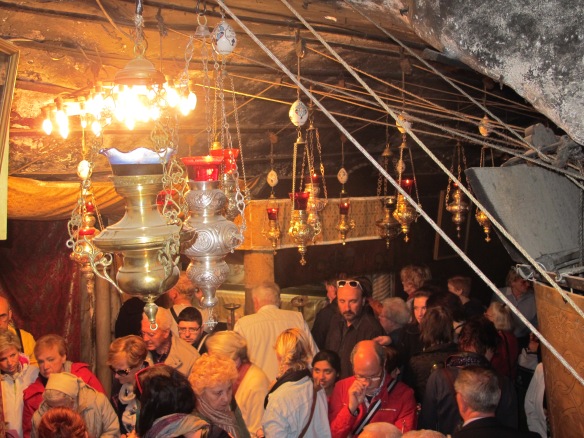“Let us drown out the howling nonsense of Gomorrah with the melodies of the New Jerusalem.” – Spurgeon
In 1996, shortly after the Rwandan genocide, just when AIDS was gaining attention, not many years after the end of Apartheid in South Africa, John and I got lost in Soweto.
There were six of us, white americans crammed in a car, driving around in circles until we stumbled upon the place where Nelson Mandela came and spoke after his release from prison. As I remember, it it was large and cavernous. We walked inside, the only ones there.
In the silence, our friend started singing in a crystal clear voice, “Amazing grace how sweet the sound, that saved a wretch like me. I once was lost but now am found, was blind but now I see.”
The notes softly bounced off the ceiling, the floor, the walls. It was a holy moment. We let it wash over us. It was a melody of the New Jerusalem.
Many years later I walked into the church of the Nativity in Bethlehem, crowded with tourists, wanting a piece of Jesus, but not necessarily wanting the sacrifice necessary for Peace.
Quite a contrast to the church in Soweto. No silence. No peace.
Palestinians. Israelis. Jews. Muslims. Christians.
On this Christmas Eve I’ve been thinking a lot about Soweto and Bethlehem and Jesus coming to restore peace between us and God. To make possible peace between us and each other.
“But you, Bethlehem, David’s country,
the runt of the litter—
From you will come the leader
who will shepherd-rule Israel.
…And the people will have a good and safe home,
for the whole world will hold him in respect—
Peacemaker of the world!” Micah 5:2-5 (MSG)
Like my friend sang in Soweto, we are all wretches, lost and found. We live in the already, but not yet. We live in the in-between time of the king of peace come to Bethlehem, but not yet come again. Meanwhile, we are called to emulate this “Peacemaker of the world”.
I wonder, will there be another “Mandela” who will emerge in Israel before Jesus returns?
Perhaps, Mandela’s strength came with his ability to enter into the story of the “other”. Often, I think the sacrifice required of us for peace is the sacrifice of absolute certainty.
Those who are absolutely certain have no reason to ask questions. No reason to listen. No reason to dialogue when they know they disagree and are certain they’re right.
If you’re “pro Israeli” do you know a Palestinian personally? Have you listened to their story of being displaced by settlers?
If you’re “pro-Palestinian” do you know an Israeli personally? Have you listened to their story of dodging bombs in Tel Aviv?
If you desire to be a peacemaker, two great resources are The Telos Group, an organization whose mission is to educate people around the goal of being pro-Palestinian, pro-Israeli, and pro-peace. And this 18 minute TED talk on the danger of a single story by Chimamanda Ngozi Adichie
Lastly, the video below is of a flash mob tribute to Nelson Mandela by the Soweto Gospel choir – an “impromtu” rendition of Asimbonanga [We have not seen him].
The song was written during Mandela’s incarceration as a call for his freedom. The last line of the song is translated: “When will we arrive at our destination?” It is a question for Bethlehem and South L.A. and Congo and Afghanistan. I don’t know the answer to that, but I ask myself:
What am I doing to sacrifice the certainty of a single story to move towards peace?




